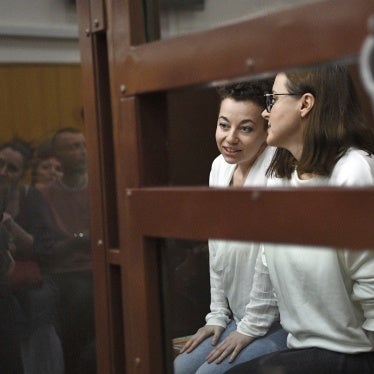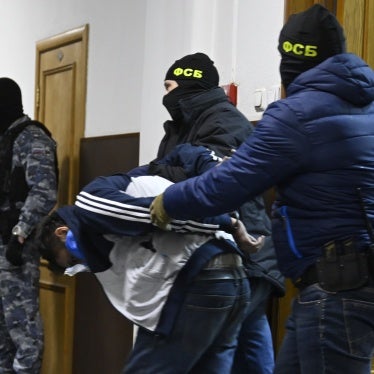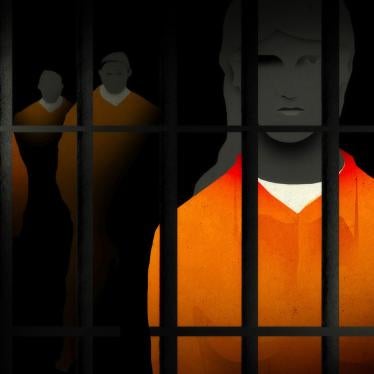The announcement last week that six terrorist suspects are eligible for trial by military commissions may have seemed a bombshell in Britain, not least because two of the six are British citizens. In the United States, by contrast, the announcement barely registered as a blip on the radar screen.
And yet Blair seems reluctant, even now, to challenge his hosts forcefully on an issue where international law is simply being trampled - at the expense of British citizens. In the circumstances, it will be extraordinary if Blair fails to speak out strongly on this issue.
Blair's role is especially important because of the widespread indifference on this subject in the United States. The announcement last week that six terrorist suspects are eligible for trial by military commissions may have seemed a bombshell in Britain, not least because two of the six are British citizens. In the United States, by contrast, the announcement barely registered as a blip on the radar screen.
For the United States, those detained at Guantanamo Bay are faceless foreigners labeled by the Bush administration as the "worst of the worst" terrorists. There is little recognition that these are real people with real families who - whatever crimes they may have committed - deserve due process. In these circumstances, it becomes doubly important for Britain to speak out.
British officials continue to talk of their "concerns" about the proposed commissions. But much more is needed. George Bush must hear from the one person he and his administration really care about: Tony Blair. From the perspective of Washington, it is not Britain which represents America's strongest ally in the global war on terror - it is the Prime Minister himself. The mutterings that we have heard from Downing Street and other ministers in recent days are insufficient. The recipient of the Congressional Gold Medal must be as blunt and outspoken as his hosts in the Bush administration are often ready to be.
Serious questions persist about the legality of the commissions under international law. Placing persons deserving prisoner-of-war status before a military commission rather than a court martial would constitute a war crime. Asserting military jurisdiction over those apprehended far from any battlefield places civilian courts everywhere at risk.
In 2002 the Bush administration addressed some of the concerns about the military commissions by adding previously disregarded due process protections. These include a presumption of innocence, ostensibly public hearings and a right of defendants to cross-examine witnesses. However, due process protections have little meaning unless the procedures in their entirety protect a defendant's basics rights. The Pentagon rules for the military commission rules fail miserably in this regard.
Indeed, the commission rules seem designed to guarantee an unfair trial. They address the legitimate need to protect national security information, including clearance procedures for civilian defence counsel and restrictions to protect classified material. But private defence counsel, even if they succeed in jumping through the necessary security hoops, may still be barred from closed hearings. All defendants must accept a military-appointed defence counsel as lead counsel. And - as the British solicitors for the two designated Britons recently learned - non-American lawyers need not apply.
Those problems are only the beginning. The rules permit the monitoring of all communications between defence lawyers and defendants "for security and intelligence purposes," shattering the fundamental principle of attorney-client confidentiality. Defence lawyers are not allowed to discuss or share documents about the case with anyone outside of the defence team. And the Pentagon recently amended provisions that would have effectively required defence lawyers to perform all legal research at the site of the trial (presumably Guantanamo Bay).
Little wonder that the U.S. government has threatened to move the case of Zacarias Moussaoui, charged with conspiracy in connection with September 11, from U.S. federal courts to a military commission after he sought to question an alleged co-conspirator. The government also dropped criminal charges against Ali Saleh al-Marri, detained since December 2001, and labeled him an "enemy combatant," thus making him possibly eligible for trial by the military commissions. So it was no surprise that the National Association of Criminal Defence Lawyers announced that the "rules regulating counsel's behaviour are just too restrictive to give us any confidence that counsel will be able to act zealously and professionally." But even the Air Force colonel named as chief defence counsel has expressed concern about the rules.
Perhaps most disturbing is the absence of any independent judicial review of the verdicts. Any review will be by the executive branch, effectively making the Bush administration the prosecutor, judge, jury and, because of the death penalty, possible executioner. To be on the safe side, the military rules contain a gag order that prohibits defence lawyers from ever speaking publicly about the cases, even to raise due process issues unrelated to security concerns. And as the administration has noted, an acquittal will not necessarily mean that the defendant will be released from detention.
In the end, few terrorist cases are likely to proceed to full trials. The lopsided rules plus the threat of capital punishment will compel defendants to accept plea agreements, even if harsh. This will permit prosecutors to declare victory, but the broader public will be deprived an important opportunity to assess guilt or innocence. Americans and others will still know little about who is being held at Guantanamo Bay and why. The fundamental rights of those accused, including the two Britons, are at stake. But so too is the broader commitment of democratic governments to justice and the rule of law in the war on terror.
The anger in the British parliament has focused so far on the need to bring British citizens home, to face trial in the UK. That demand is understandable, in one respect. But the lack of due process is important for all those who are held at Guantanamo, not just the British. For British and other nationalities alike, the key issue is not where the trials take place but how they take place. International law must be restored.
Until now, Downing Street has seemed eager to blunt the edge of its own criticisms, with "on the one hand... on the other hand" phrases, which imply that the lack of due process in the military commissions is somehow made less serious because of the gravity of the alleged crimes. In reality, it is in the case of serious crimes, above all, that due process matters more than ever.
A mealy-mouthed approach by Tony Blair in the days to come will help nobody. On the contrary. A failure to speak out strongly will be dangerous for all.








